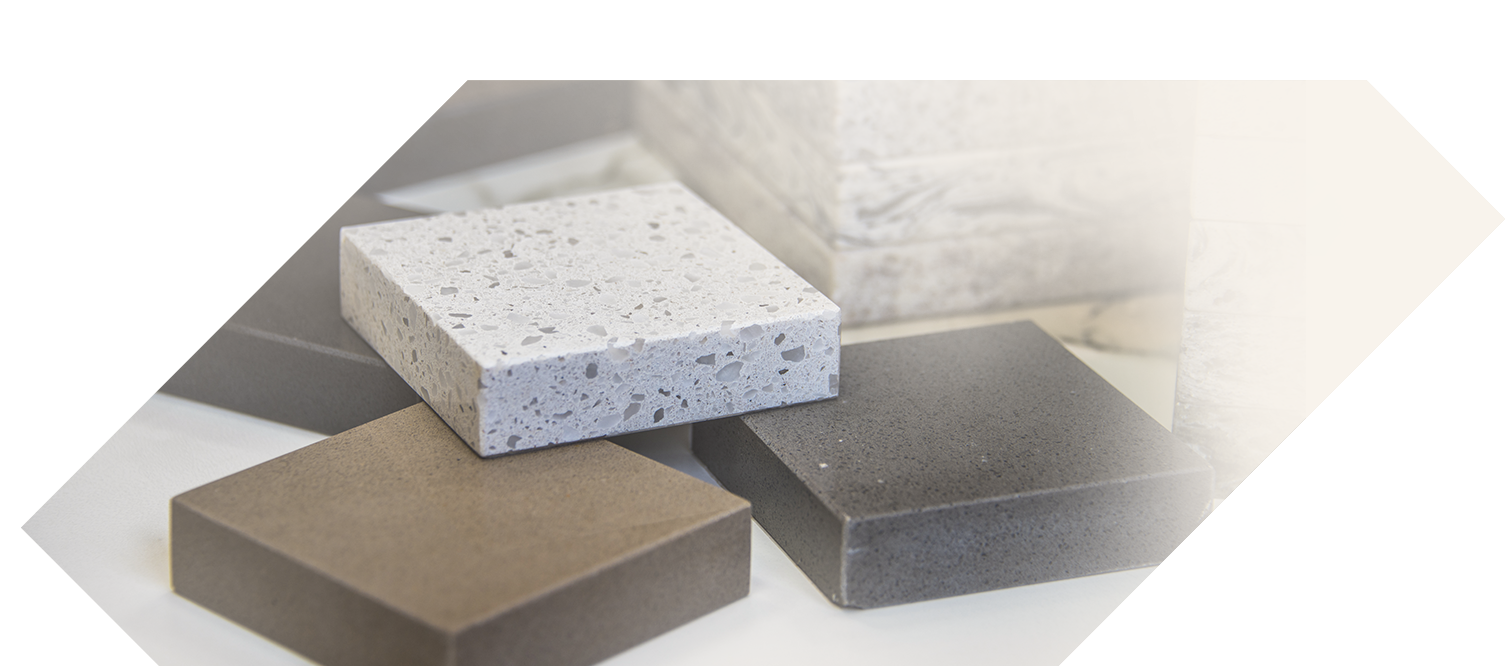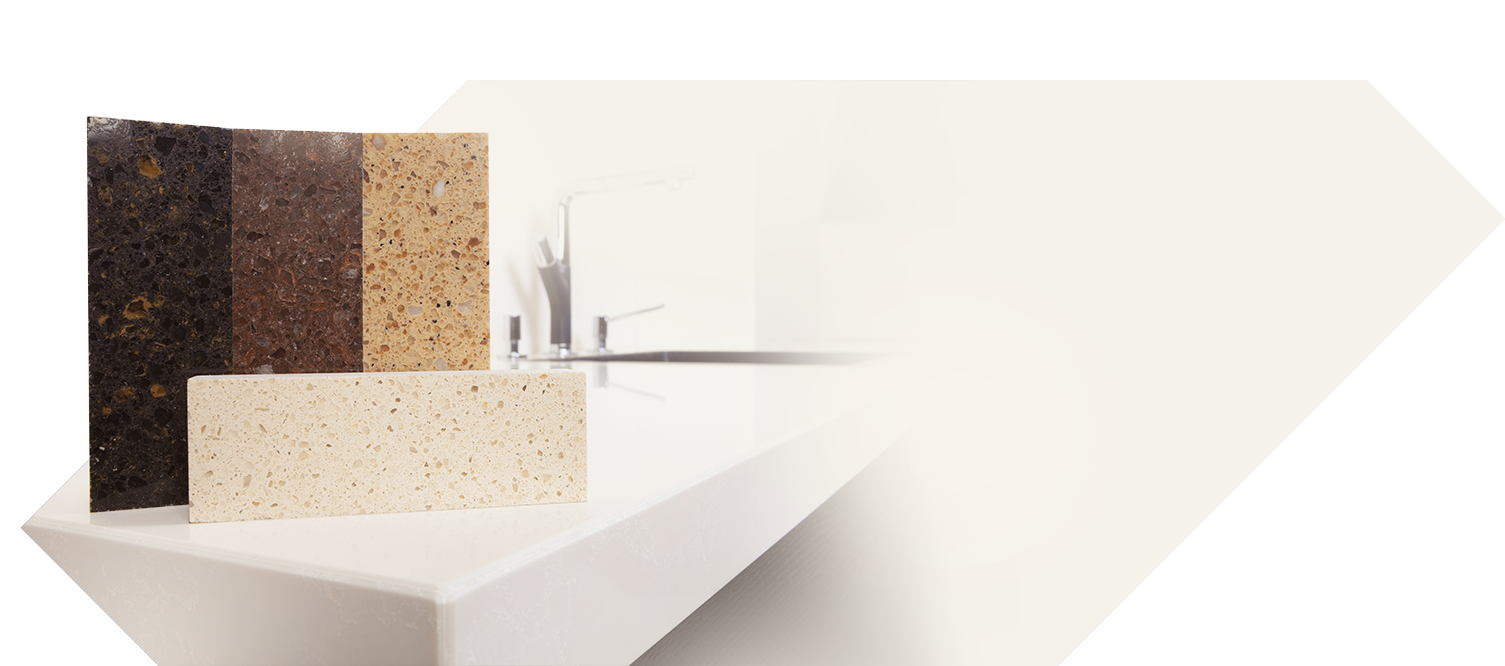
COUNTERTOPS
Renovating a kitchen or bathroom can feel like a big job.
Selecting the countertops is an important yet exciting part of renovating your kitchen. There are a lot of options available these days to add beauty to your home and durability to your countertops.
One of our favorites for both kitchens and bathroom is quartz.
Over the last decade it has become one of the most popular choices in countertops thanks to its beautiful designs and durability.
Our Countertops are Personalized in Detail
QUARTZ
COUNTERTOPS
Renovating a kitchen or bathroom can feel like a big job. Selecting the countertops is an important yet exciting part of renovating your kitchen. There are a lot of options available these days to add beauty to your home and durability to your countertops.
One of our favorites for both kitchens and bathroom is quartz. Over the last decade it has become one of the most popular choices in countertops thanks to its beautiful designs and durability.


What is Quartz?
Quartz is a mineral and one of the most common on the planet. It is well known for its resistance to weathering and durability.
Quartz countertops are made by using 93% crushed quartz crystals fused together with 7% poly-resin materials.
Combining these substances under pressure creates an incredibly solid engineered stone.
What is Quartz?
Quartz is a mineral and one of the most common on the planet. It is well known for its resistance to weathering and durability.
Quartz countertops are made by using 93% crushed quartz crystals fused together with 7% poly-resin materials.
Combining these substances under pressure creates an incredibly solid engineered stone.


How is Quartz Different From Granite?
What are the pros and cons of quartz countertops versus granite. There are many differences and while either would make a beautiful choice in your kitchen, they each have unique properties you might not be aware of.
- Quartz is man-made: As we stated earlier, quartz is engineered, made from all natural materials but then combined together to create an incredibly strong countertop material. Granite on the other hand is completely natural and quarried from the earth and then cut. Quartz can be created any size and thickness, such as the 2 cm and 3 cm varieties that are incredibly popular.
- Quartz can be created in a number of colors: Granite, as a natural stone, comes in are all-natural colors such as grays, browns, tans and white with variations in the hues. Dyes can be added to quartz during creation to produce brilliantly colored slabs.
Our countertops are personalized in detail
How is Quartz Different From Granite?
What are the pros and cons of quartz countertops versus granite. There are many differences and while either would make a beautiful choice in your kitchen, they each have unique properties you might not be aware of.
- Quartz is man-made: As we stated earlier, quartz is engineered, made from all natural materials but then combined together to create an incredibly strong countertop material. Granite on the other hand is completely natural and quarried from the earth and then cut. Quartz can be created any size and thickness, such as the 2 cm and 3 cm varieties that are incredibly popular.
- Quartz can be created in a number of colors: Granite, as a natural stone, comes in are all-natural colors such as grays, browns, tans and white with variations in the hues. Dyes can be added to quartz during creation to produce brilliantly colored slabs.


- Quartz has a defined and uniformed pattern: manufactured under controlled conditions by mixing desired kinds and proportions of pigments. It has a uniformed appearance, which just adds to its popularity in the Charlotte Metro area.
- Quartz is nearly nonporous: While both quartz and granite are exceptionally durable, granite is naturally occuring, based on the minerals that comprise it and will vary in porosity. Because of this; under some circumstances, granite can stain. To prevent this, granite countertops need to be sealed to keep the moisture out. However, with quartz countertops, you will never need to seal them, making maintenance.
- Quartz has a defined and uniformed pattern: manufactured under controlled conditions by mixing desired kinds and proportions of pigments. It has a uniformed appearance, which just adds to its popularity in the Charlotte Metro area.
- Quartz is nearly nonporous: While both quartz and granite are exceptionally durable, granite is naturally occuring, based on the minerals that comprise it and will vary in porosity. Because of this; under some circumstances, granite can stain. To prevent this, granite countertops need to be sealed to keep the moisture out. However, with quartz countertops, you will never need to seal them, making maintenance.


- Quartz is more expensive, but only marginally. Homeowners sometimes decide to use granite as a less expensive option. But in comparison to the higher-grade granite colors, quartz and granite are very similarly priced.
- Quartz can be affected by heat. Since it is a natural stone, granite excels at withstanding high temperatures. Quartz on the other hand, is created with synthetic poly-resin materials and sometimes the resin can discolor with high heat, mostly on the lighter colored options. While quartz is durable, using pot holders for hot dishes is highly recommended.
- Quartz is more expensive, but only marginally. Homeowners sometimes decide to use granite as a less expensive option. But in comparison to the higher-grade granite colors, quartz and granite are very similarly priced.
- Quartz can be affected by heat. Since it is a natural stone, granite excels at withstanding high temperatures. Quartz on the other hand, is created with synthetic poly-resin materials and sometimes the resin can discolor with high heat, mostly on the lighter colored options. While quartz is durable, using pot holders for hot dishes is highly recommended.


